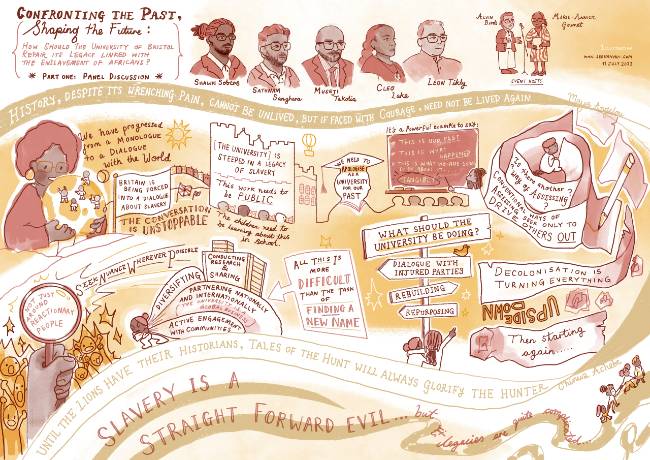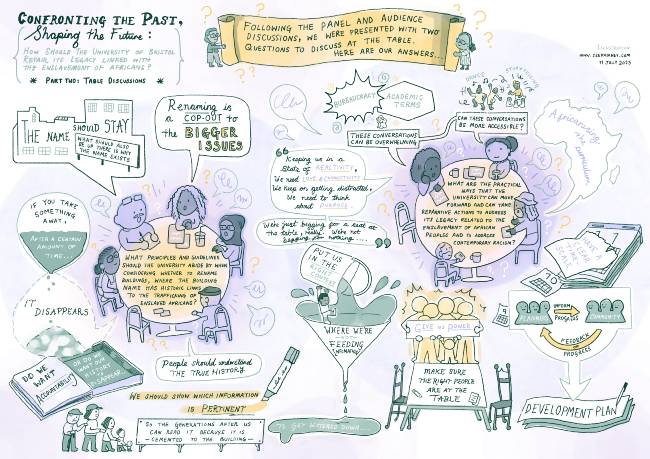Confronting the past, shaping the future illustration descriptions
Artist Seekan Hui created two illustrations, capturing some of the conversation points during a public consultation event at the Rose Green Centre, 11 July 2023.
This is a description of the illustrations commissioned as a visual summary of the public consultation event, Confronting the Past, Shaping the Future.
- Read the panel discussion illustration description
- Read the table discussions illustration description
Part one: panel discussion illustration

The illustration is drawn in brown, orange and white. Parts of conversations during the discussion are written out separately with a relevant illustration.
The event name ‘Confronting the past, shaping the future’ and discussion topic 'How should the University of Bristol repair its legacy link with the enslavement of Africans?' appear at the top of the illustration.
There are illustrations of the panellists with their names:
- Shawn Sobers
- Sathnam Sanghera
- Museji Takolia
- Cleo Lake
- Leon Tikly
There is an illustration of the event hosts, shown grouped around a microphone, with their names:
- Alvin Birdi
- Marie-Annick Gournet
Quote: “History, despite its wrenching pain, cannot be unlived, but if faced with courage, need not be lived again.“ - Maya Angelou
Record of conversations
Parts of conversations heard during the discussion are included with relevant illustrations:
- "We have progressed from a monologue to a dialogue with the world."
- "Britain is being forced into a dialogue about slavery."
- "The conversation is unstoppable."
- "The University is steeped in a legacy of slavery. This work needs to be public. The children need to be learning about this in school."
- "We need to apologies as a university for our past."
- "It’s a powerful example to say:
- This is our past
- This is what happened
- This is what we are going to do about it…
- Tangibly"
- "Not just around reactionary people."
- "Seek nuance wherever possible."
- "Conducting research and sharing:
- Diversifying
- Partnering nationally and internationally (the University is a global business).
- Active engagement with communities
- All of this is more difficult than the task of finding a new name."
- "What should the University be doing?
- Dialogue with injured parties
- Rebuilding
- Repurposing"
- "Is there another way of assessing?
- Conventional ways of assessing seek only to drive others out.
- Decolonisation is turning everything upside down then starting again…"
Quote: “Until the lions have their historians, tales of the hunt will always glorify the hunter” – Chinua Achebe
The final text at the bottom of the illustration reads: 'slavery is a straightforward evil… But its legacies are quite complicated.'
Part two: table discussions illustration

The illustration is drawn in purple, yellow, grey and white. The illustration shows two tables with people seated around them, with speech bubbles and question marks indicating they are involved in conversation.
The event name ‘Confronting the past, shaping the future’ and discussion topic 'How should the University of Bristol repair its legacy link with the enslavement of Africans?' appear at the top of the illustration.
Next to the event name, two characters stand at either end of a scroll, which has the words: 'Following the panel and audience discussion, we were presented with two questions to discuss at the table. Here are our answers...'
Each table has a different question written on it, and speech bubbles are drawn for people at each table to show some of the answers and comments said.
Table on the left
Question
The discussion question appears on the middle of the table: ‘What principles and guidelines should the University abide by when considering whether to rename buildings, where the building name has historic links 'to the trafficking of enslaved Africans?'
Answers and comments said around the table
- "Renaming is a cop-out to the bigger issues"
- "The name should stay. What should also be up there is why the name exists."
- "If you take something away after a certain amount of time it disappears"
- "Do we want accountability, or do we want our history to disappear?"
- "People should understand the true history."
- "We should show which information is pertinent so the generations after us can read it because it is cemented to the building."
Table on the right
Question
The discussion question appears on the middle of the table: ‘What are the practical ways that the University can move forward and can take reparative actions to address its legacy related to the enslavement of African peoples and to address contemporary racism?'
Answers and comments said around the table
- "These conversations are overwhelming. Bureaucracy, academic terms."
- "Can these conversations be more accessible? Dance, storytelling."
- "Keeping us in a state of reactivity. We need love and connectivity. We keep on getting distracted. We need to think about purpose."
- "We’re just begging for a seat at the table, really. We’re not begging for nothing…"
- "Put us in the right context where we’re not feeding information to get watered down..."
- "Africanising the curriculum"
- "Have a clear timescale
- Planners, inform progress to the community, feedback progress to the planners.
- Make a development plan"
- "Give us power. Make sure the right people are at the table."
